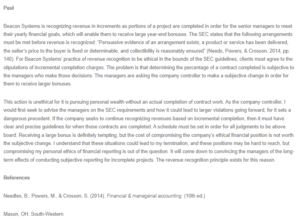Response – Ethics and Financial Reporting
I agree with you, Paul; senior managers are increasing the percentage of completion for personal financial gain. The company must set appropriate guidelines concerning its basis of revenue recognition. Changing the company’s financial position can negatively impact the company’s image as well as cause a decline in its share price. The company should set dates as to when the contracts should be completed and only the percentage completed should be recognized in the period.
The revenue recognition principle states that a company should recognize revenue only when recognized. Revenues are recognized when they are realized or realizable and are earned except where they are recognized on a cash basis. To avoid fraudulent acts, the company should create a basis to apportion the total contract revenue between the multiple accounting periods; this is also provided under the percentage of completion method rather than being a full contract method. As a controller, complying with the management’s request will definitely compromise professional ethics.
Disclosing wrong information in the financial statements may cost investors, creditors, employees, and customers of the company (Hoyle, 2015). Investors rely on financial reports to make investment decisions; any misleading information will result in wrong decision-making. Creditors also rely on the company’s financial performance to decide whether or not it is worth their finances. Senior managers need to have a good understanding of SEC guidelines on the principle of revenue recognition as well as the consequences of failure to comply with the guidelines. Not only the company’s image will be ruined by the attempt to disclose wrong financial information, but also the career of the senior managers. Misrepresentation of financial information may land them high penalties that will be costlier than the expected financial benefit.
References
Hoyle, J. B. (2015). Advanced accounting. McGraw Hill.
ORDER A PLAGIARISM-FREE PAPER HERE
We’ll write everything from scratch
Question

Response – Ethics and Financial Reporting
Paul
Beacon Systems recognizes revenue in increments as portions of a project are completed in order for the senior managers to meet their yearly financial goals, which will enable them to receive large year-end bonuses. The SEC states that the following arrangements must be met before revenue is recognized: “Persuasive evidence of an arrangement exists, a product or service has been delivered, the seller’s price to the buyer is fixed or determinable, and collectibility is reasonably ensured” (Needs, Powers, & Crosson, 2014, pp. 140). For Beacon Systems’ practice of revenue recognition to be ethical in the bounds of the SEC guidelines, clients must agree to the stipulations of incremental completion charges. The problem is that determining the percentage of a contract completed is subjective to the managers who make those decisions. The managers are asking the company controller to make a subjective change in order for them to receive larger bonuses.
This action is unethical, for it is pursuing personal wealth without an actual completion of contract work. As the company controller, I would first seek to advise the managers on the SEC requirements and how it could lead to larger violations going forward, for it sets a dangerous precedent. If the company seeks to continue recognizing revenues based on incremental completion, then it must have clear and precise guidelines for when those contracts are completed. A schedule must be set in order for all judgments to be above board. Receiving a large bonus is definitely tempting, but the cost of compromising the company’s ethical financial position is not worth the subjective change. I understand that these situations could lead to my termination, and these positions may be hard to reach, but compromising my personal ethics of financial reporting is out of the question. It will come down to convincing the managers of the long-term effects of conducting subjective reporting for incomplete projects. The revenue recognition principle exists for this reason.
References
Needles, B., Powers, M., & Crosson, S. (2014). Financial & managerial accounting. (10th ed.)
Mason, OH. South-Western.

